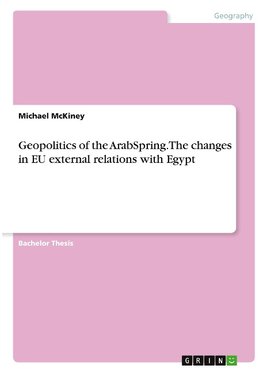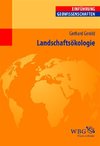
-
 Anglický jazyk
Anglický jazyk
Geopolitics of the ArabSpring. The changes in EU external relations with Egypt
Autor: Michael McKiney
Bachelor Thesis from the year 2020 in the subject Earth Science / Geography - Geopolitics, grade: 2.0, University of Bonn, language: English, abstract: In this bachelor thesis the changes in the EU's external relations with the Arab Republic of Egypt before... Viac o knihe
Na objednávku, dodanie 2-4 týždne
27.36 €
bežná cena: 28.80 €
O knihe
Bachelor Thesis from the year 2020 in the subject Earth Science / Geography - Geopolitics, grade: 2.0, University of Bonn, language: English, abstract: In this bachelor thesis the changes in the EU's external relations with the Arab Republic of Egypt before the "Arab Spring", in response to the "Arab Spring" and in the aftermath of the revolutionary democratic movement, and the respective motives and agendas behind these external relations, will be analysed. In this thesis the term "Arab Spring" will define the entire period of democratisation in Egypt, as this will provide a more coherent structure and facilitate the analysis.
In December of 2010 a Tunisian street vendor named Mohammed Bouazizi set himself on fire to protest the confiscation of his vegetable stand by the police. This self ignition was the starting point for a wave of government protests which started in Tunisia and swept through many Arab countries. This movement of pro-democracy protests is most often referred in the media and in public culture as the "Arab Spring", alluding to the Prague Spring of 1968, a pro democracy movement in the former Czechoslovakia. The "Arab Spring" was a heterogeneous pro-democracy, government critical protest movement which had very different outcomes in the various Arab countries. E.g. in Lybia, Syria and Jemen the protests led to, at the time of writing, still ongoing civil wars, in Quatar the protests were suppressed and in Tunisia and Egypt they led to democratic elections being held, following the ousting of the authoritarian president Ben Ali and Mubarak.
These wave of protests came as a surprise to the international community and due to the instability which followed the protests in many of the affected countries, the "Arab Spring" was of critical geopolitical importance. Especially for the European Union (EU) this was the case mainly due to its geographic proximity. The EU has maritime borders with many of the affected muslim Arab countries in the Mediterranean. The Mediterranean has been defined as a homogenous region of interest for the EU since 1972, with the establishment of the Global Mediterranean Policy. The Mediterranean region constructed by the EU refers to the EU's southern Arab neighbours (and Israel, Turkey), which includes many of the countries affected by the "Arab Spring". Due to this geographic proximity the EU has certain interests and agendas in the region.
- Vydavateľstvo: GRIN Verlag
- Rok vydania: 2021
- Formát: Paperback
- Rozmer: 210 x 148 mm
- Jazyk: Anglický jazyk
- ISBN: 9783346339423



 Nemecký jazyk
Nemecký jazyk 
 Francúzsky jazyk
Francúzsky jazyk 







